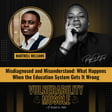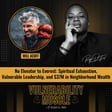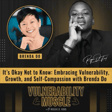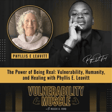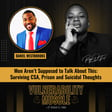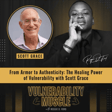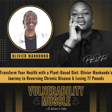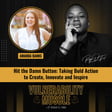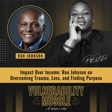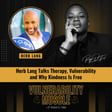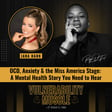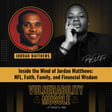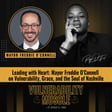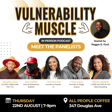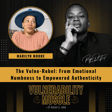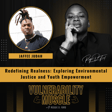A Personal Story of Loss and Emotion
00:00:00
Speaker
My father had cirrhosis of the liver. And he had this gold necklace on. Never took it off. Never took it off. And he told me, he said, if I ever take it off, I won't be back. My dad was in his final stages and my mom took us to the hospital. And I'm looking at my dad and I'm like seven at the time, right? Or about to turn eight. So I'm looking at him like, wow, okay. And he's not responding. So he's just laying there.
00:00:31
Speaker
And then I look at his name and the chain is gone. Damn. That was the last time I cried for 30 years. Welcome to
Introducing 'Vulnerability Muscle' Podcast
00:00:39
Speaker
Vulnerability Muscle, the empowering podcast, challenging norms, and guiding you to find strength and power through vulnerability. I'm your host, Reggie D. Ford. In a world that often portrays vulnerability as a sign of weakness, I believe it is a source of tremendous strength and authenticity.
00:00:57
Speaker
Through insightful conversations and thought-provoking interviews, Vulnerability Muscle aims to redefine vulnerability and help listeners develop a new perspective on their own lives. Each episode of Vulnerability Muscle delves into a variety of topics such as mental health, social issues, and mindset shifts. We explore the power of vulnerability in healing, building resilience, and promoting personal growth as well as fostering meaningful connections.
00:01:23
Speaker
This podcast provides practical tools and strategies to navigate life's challenges, overcome adversity, and create more inclusive and just environments for all people.
Trevor Jones Talks Personal Growth and Grief
00:01:33
Speaker
Trevor Jones, Village Culture. What's up, brother? How you doing? I'm doing well, Reggie. You know, it's a beautiful day in the neighborhood. Wednesday, halfway through the week, I get to talk to you and chop it up, man. I'm good. How are you?
00:01:46
Speaker
I'm doing well. I'm doing well. It's been a busy day. I've gotten a lot done today in a productive way. I always kick off my Wednesdays with a therapy session, which is it can go one or two ways. It could be a day where I'm
00:02:03
Speaker
like energized and ready to go get it or a day where I'm like, yeah, I'm going to have to cancel the rest of this because your boy being his feelings. Oh, but now today was a good day. Like today, uh, you know, I unfortunately had a family member pass recently. I appreciate that. She was, she was in her forties. Um, and you know, just, just tragic and to see,
00:02:31
Speaker
My family and see her, her kids, her sons, uh, you know, have to lose their mom and greet. And we all grieving at losses. It's tough. So we talked a lot about grief today in therapy, which was good and healing for me.
Men, Emotions, and Societal Expectations
00:02:43
Speaker
That's tough. And, you know, you know, it's, uh, and we'll talk about it more. I think one thing from our standpoint as men is something that we really need to focus on more. It's, it's okay to grieve, right? Yeah. You know, for us, we keep that in and we hold it and we don't want anyone to know we're hurt.
00:03:01
Speaker
But it's okay. It's okay to let go. You being in this space, I think it's an amazing thing because you give that out. You let men know that they can be men and still be emotional. So yeah, that's a beautiful thing. Yeah, I appreciate that, man. It's okay to grieve and it's important to grieve.
Rapid Response: Stress and Fitness
00:03:21
Speaker
You got to. You got to let it out.
00:03:24
Speaker
Yeah, I'm excited, but I like to start with, well, I'm just now doing this, I'm incorporating this, but starting with rapid response, we used to end it, but just a couple of quick things that come to mind. First thing, I'm gonna start off a little easy, then it's gonna get a little bit harder, okay? Well, I got a question. Are you starting out with me? Am I the first person you do this with? Thanks, man. You're the second, but I learned from the first one, so here we go. Oh, man, all right, let's go. All right, this is the easy one.
00:03:54
Speaker
What do you do? What is something you do when you're feeling stressed to relax? Go to the gym. Work out. Okay. Strength training. Cardio, what do you do? You know, I started out strength training. It was one thing that I was able to do consistently for a long time. So it became a habit. And once I started doing that, I realized the importance of the stress and the pressure that I get in and out by going to the gym. So whenever I'm stressed out,
00:04:24
Speaker
I go to the gym, but to your point, before I got hurt, I was doing pretty much strength on everything. So every time I went to the gym, I'm lifting heavy. I'm trying to get my new records. But once I injured myself, I started to go towards high intensity reps. So it's muscle and attention. So 12 to 15 reps. And by the time I leave, I feel a lot better. I got that stress off.
00:04:52
Speaker
I'm getting a good sweat and I'm ready to face the world again. Yes. Yes. Exercise is so good. So good for the body, for the mind, for it all. So how'd you hurt yourself? This is not part of the rapid response. I had. And as I get older, I'm a little bit older, but as I got older, I realized the importance of stretching, right? Plant sports, lifting for an extended amount of time, years on years on years and never really
00:05:21
Speaker
doing the proper stretching, it caught up to me. So that said, I tore my rotator cuff. Actually, both of them are torn, but I had to get surgery on the right one. Dr. L. Rod was like, now this is it, you have to do it right now. But now we're in conversations on when and if I'm gonna do the left, but it hurts, man. Rotator cuff, it is a difficult,
00:05:48
Speaker
It's a difficult thing to get through. It's
Reflecting on Leadership and Legacy
00:05:50
Speaker
pain. It's not pain because you don't realize how much of your body is being used with your shoulders. Yeah. Yeah. Every time. Okay. Let's get back to it. Let me go. What is a book or movie that everyone should read or watch? Man, that is a good question. Oh.
00:06:15
Speaker
Perseverance through severe dysfunction. But he stands up, man. I'll pretty much do whatever I need to do to make sure he's good. So this is something that people need to read. This, this is a real deal right here from a good guy. Thank you. Thank you for that. It's on my desk, man. It's on my desk here. I appreciate that. That's real.
00:06:40
Speaker
All right, last one for the beginning. If you could have a conversation with anyone living or dead, who would it be and why? That's a good question. I'm on this kick now where I'm looking and listening to outside the box thinkers, right? People going against the norm. So when I say that, what comes to me is like a Malcolm X, Martin Luther King. These are people that went against the grain
00:07:09
Speaker
but they knew it was a better good. So if I had the ability to sit down, I would love to sit down with Martin Luther King and just kind of get and pick his brain, you know, because I was watching Martin Malcolm X and, you know, not getting into, you know, all the details, but sometimes I get in my mold where I just kind of want to see if I can feel what they're feeling. Right. When you when you know you're different,
00:07:35
Speaker
You want to be around people that are different, or you want to see what that person is doing that truly makes them different, and what is their gift. So fast forward, when I was looking at the end of the movie, it almost brought me to tears because he knew he was going to die. He knew he was, and he was at peace, right? You're at peace, but on top of that, you're going to leave your family.
00:08:04
Speaker
did he really know he had a legacy? That's the big part. Yeah. So when I look at that, I would love to sit down and talk to thought leaders and see, OK, what made you decide, OK, enough is enough. Or I'm going to follow my purpose. Because it's something that I struggle with all the time. You and I talk about it. Village culture, it wasn't something that I thought from day one I was going to do. And I'm still doing it. And a lot of times, I'm going off faith, but also fears there.
00:08:35
Speaker
And I'm not even at that level to where they are now. So, you know, for me to sit down and being able to talk to them would be, I think would be key. But for someone that's still alive, I think it would be amazing to have a conversation with like a Obama. You know, because he's in, he's in spaces and in places that we have never gone before. So, you know, just the pressure, like we, we deal with pressure all day long, but in his space, how does he deal with his pressure?
00:09:05
Speaker
And how do you think about next moves, right? Because to be a leader of people is tough. But being a leader of the free world, I'm sure is even tougher as a man of color. We saw his hair go from real nice to gray. Still nice, but gray as can be. And man, so you know he has some stress up on his shoulders. Definitely, but think about this. He still had his swag.
00:09:35
Speaker
no matter what he was going through. And we cannot imagine, it's great for a reason. And it wasn't like it took a long time. But you still have, and when I was a leader of people, I would always tell my staff, whatever you have going on outside of work, that's one thing. But when you come into the office, I need you to be on stage, right? Because you have to perform. You can't let people see you down. So when I look at him, I thought about that a lot because I can only imagine
00:10:05
Speaker
the weight he had on his shoulder. Those would be the people I would love to speak with. You said one, but those are the top. No, that's good. Actually, I just got a call. I couldn't even pick it up. Roderick, I cannot answer right now, but I will be there in the morning. I'm speaking at a school for MLK Day, talking about his legacy and also Black History Month. Start kicks off tomorrow. This will probably air later on this year.
00:10:34
Speaker
Yeah. That's awesome. I've been tapped in learning a little bit about MLK. Like you said, Malcolm X, that's one person I feel is greatly misunderstood because of how he's been portrayed in history. So much of what his thought leadership was back in the day, you hear it in these leaders and activists of today,
00:10:57
Speaker
And it still rings true. And it blows my mind that we've come this many years and still are dealing with a lot of the issues that they both had identified with back then.
Trevor's Life Journey and Family Impact
00:11:11
Speaker
But no, that's huge. Tell me. I'm going to add to that one thing, which is, and maybe I'm missing the point. And I have a conversation pretty much weekly in regards to this.
00:11:27
Speaker
One of the things that I thought was amazing is to have people follow you, right? Be a leader and people follow you. People died for you. People went to jail for you because of your vision, right? We don't have that nowadays. Like who is our one person that will follow, that we will follow? And that's disheartening to me because we have a lot of intelligent people of color.
00:11:57
Speaker
But no one is taking that lead, or for whatever reason, I'm not aware of one. You may know, but I don't know one where I'm like, you know what? Whatever he says, I believe in what he's doing. I'm a follower. Can you theorize why that may be the case, why we don't have that leader? Man, I hear it all the time where we're not used to it. We weren't raised that way. We're learned to fight against each other.
00:12:26
Speaker
I can't, I really can't because like when I did Village Culture, and I thought about why me? Like why would God choose me to do Village Culture? I'm not the smartest, I'm not the best looking, but he decided I was the one to do it. I would think someone else would have that same vision, same purpose on them as well, right? But to answer your question, I don't know. I really don't know because
00:12:55
Speaker
There are a lot of smart people in this world, a lot of intelligent people in this world, but no one's on the forefront of, okay, let me bring my people together. Yeah. You know what I think about? I think it is fear. And I think it's deeply ingrained fear from, you know, the two people that we named were murdered, were executed, right? That's not by accident.
00:13:22
Speaker
There's no accident that Martin Luther King was killed, Malcolm X was killed. He's these very prominent leaders of Black movements throughout like, and you can keep our own name in folks, right? Were killed for being those people that led and being those people who people would follow, like they sparked
00:13:42
Speaker
change in the masses. And that is a threat. It's a threat to status quo. And I think the reason we don't see as many of those leaders today is because even if it's not a conscious fear, it's a subconscious belief that you get out there and you're gonna get killed, right? When we saw Obama, you know, when he first got elected, I was holding my breath. Hold my breath.
00:14:10
Speaker
when he was going through his inauguration and thinking like, but luckily, you know, he's still here with us. But I think that's why, that's just my theory on it. Like the fear that has been instilled in those who would probably be a leader or also just like the silencing or somewhat muting those people that do have that ability. So I think about that a lot. Cause I still, I feel disheartened in a way too.
00:14:40
Speaker
same way you do. Well, maybe we can, we can figure something out, man. I'm promoting you. This is what I'm saying. Look, Trevor's not the guy, not the first Trevor, maybe the second Trevor, maybe my son. TJ, TJ will get it done. He may get it done. Let's back it up a little bit. Tell, tell the world who Trevor Jones is and who Village Culture is as a, as an organization. Just give us a little background.
00:15:04
Speaker
You know, that's one of the questions I get from so many different people. I get it in a corporate world, I get it in the gym, I get it in, when I'm talking about villainous culture, and I can go a lot of different ways, but in a nutshell, born in Sacramento, California, at the age of eight, moved to Mobile after my father passed away. And Mobile was a place where I learned life is not fair, right?
00:15:32
Speaker
When I was in Sacramento, my best friend was white. My other best friend was Hispanic. My other best friend was black. I go to Mobile first day in school. I didn't know the difference, right? But I'm looking around and I see whites in one area. I see blacks in one area. I'm in the middle because I'm not, I don't know what way to go, but the teacher directs me over to,
00:16:01
Speaker
Wow. My people, right? My people of color, right? And it hurt, right? Because I didn't understand. I didn't understand that. But that's kind of another conversation. So I moved to Mobile, and then at the age of 16, I moved back to Sacramento. Because it was more stuff. And Mobile is a deep south. A lot of different things I didn't like. And my mom, she let me move back. And I lived with my aunt and uncle. And I learned another lesson. There's no love like mom's love.
00:16:31
Speaker
But my mom was a single mom. And when I moved in with my aunt and uncle, that's where I really learned structure. My aunt was German. My uncle met her in Germany. She didn't speak any English. And when I moved in with her, she taught me, we don't do excuses. She said, you know, Trevor, when I came to United States, I could not speak English. Your uncle was a drunk. Your family didn't like me.
00:17:02
Speaker
And all of that reversed. Family looks up to her. She was my financial person. She taught me how to wash and dry clothes. She taught me how to, you know, at a different level, treat women. So I learned two sides of that, right? Of single parent versus, you know, dual parents in the home.
The Cultural Role of Barbershops
00:17:21
Speaker
So I lived there and I did two years of college in Sacramento. Then I transferred to Tennessee State, went there. I had two brothers and one sister.
00:17:31
Speaker
At the time, both of my brothers were in Nashville. So they were pushing me to come back. So I finally decided to move to Nashville. And my sister lives in Mobile and my mom at the time was in Nashville. Well, no, she was in Mobile. I'm sorry. But eventually she does move to Nashville. She lives with me and Danielle. So I have a wife, Danielle, and I have a son, of course, Trevor, the little guy. Yeah. And I'm in the corporate world.
00:17:59
Speaker
But, you know, we talk about, you know, Mitch and Villa's culture, you know, that's a whole nother story. But, you know, I'll start with for 30 years, I would always ask God, why do you have me on this earth? And when COVID hit, like you said, what do I like to do for stress? It was working out and it was going to the gym. And when COVID hit, all of that stopped. Well, working out and getting haircuts, right? All of that stopped. And that's when I really had to sit down and listen. In this office here,
00:18:28
Speaker
I sit here every day. I still had a job, thank God, but I had downtime. And during that time is when I really had to listen. And that's when God started talking to me and telling me, okay, this is your why. Your why is you're going to change the world one haircut at a time. And it was like, it was scary because at first I heard it, it came to me, but I'm like, whatever. But it kept coming. And then it started getting deeper and my emotions started getting deeper and I started getting
00:18:58
Speaker
I'm like, man, what is this? And it came to the point where, okay, I'm going to start paying for haircuts. I'm start paying for haircuts. I can, you know, pay a couple of hundred dollars a month and take care of a couple of kids. But it was around the same time I met with my mentor and I'm telling him how heavy it is on my heart. And, you know, we always sit down and he was just like, and I say mentor, but I probably would go more towards big brother.
00:19:27
Speaker
because he took a liking to me and didn't have to, but he saw something in me. It's important to have those people in your life. It definitely is because without his conversation, Villas Coach would have never happened. Because he understood just by the feelings that I had and the passion when I'm speaking to him, it was something different. And he told me if I was serious about doing it, he would help
00:19:53
Speaker
And that was one week. The next week I'm on the phone with his lawyer, which became my lawyer. And it got started. Village culture was on his way and we're here today. So the brief story of me, you know, I got a different thing in the world. One haircut at a time.
Family, Alcoholism, and Emotional Impact
00:20:11
Speaker
Man, it's real. And everybody has that, that memory. Everybody has that haircut memory. And they may not know the first haircut like I do, but for the most part, you can tell
00:20:23
Speaker
when someone has a haircut, a fresh haircut, they feel better. But for me, as I got older, that's when I really started reflecting on how important it was to me. I was a shy guy. I didn't really talk a lot. But when I was in the barber shop, that's when I felt comfortable. I felt comfortable. And I didn't have to talk. I'm just in the shop listening. But you met my barber. You met Lamont. I've known him for, I've known him since 97. All started out.
00:20:53
Speaker
from the barbershop. The barbershop. I mean, the movie barbershop, Ice Cube, I think it does such a good depiction of what goes down. You never know what the conversation is going to be. You don't know what's going to happen, but you're going to leave with laughs, gyms, something. You're going to leave with something that you want to go talk to somebody else about. That's what's up.
00:21:15
Speaker
Uh, man, you, uh, you talked about a lot with like, I just want to go back a little bit. One transitioning from, from Sacramento to Mobile after your dad passed away. What do you, do you remember much of your dad in your life? I do. I do. Um, you know, we can get deep now a little bit deeper. So I was, I was really close to my dad. Um, again, so I have two brothers, one sister, my oldest brother didn't get along with my father. And he, so I was eight, he was probably 11.
00:21:45
Speaker
My sister was 10 and then it was myself and then my younger brother. So I was that one where I still had the strongest relationship with my father, right? My father and my son, my brother didn't care for him. My oldest brother, my sister, she's a girl, so she had to be around my mom a lot more. She didn't really just go over my father's house. And my little brother, he was a baby, right?
00:22:11
Speaker
So I was at the age where I was able to hang out with a man a lot more. But one memory that stuck with me, which it took me a long time to get over Reggie, was my father picked me up one time and he said, son, I love you. Son, I love you. So. That's real. Fast forward. My father passes away.
00:22:40
Speaker
And before he passes, let me backtrack a little bit. My father had cirrhosis of the liver. And I knew he always had a bottle around him and all that. But he wasn't poor or anything. He was OK, financially. And he had this gold necklace on. Never took it off. Never took it off. And he told me, he said, if I ever take it off, I won't be back. Wow. Yeah, right.
00:23:10
Speaker
I, uh, my dad was in his final stages and my mom took us to the hospital. And I was, I didn't say a lot. Like I didn't say a lot. So we all went in and I'm looking at my dad and he was like, so my dad is Creole, but he was like real yellow. And I'm like seven at the time, right? Or about to turn eight. So I'm looking at him like, wow. Okay. And he's not responding. So he's just laying there.
00:23:40
Speaker
And then I look at his neck and the chain is gone. Damn. That was the last time I cried for 30 years. Damn. You know what I mean? I'll tell you what I cried. So. And people always like, dude, you're always smiling, you're always smiling. My smile was covering up the pain, you know, because no one I feel like no one understood my pain.
00:24:09
Speaker
when I have my father, the guy I look up to, look me in my eyes and tell me he loved me. My thought was, okay, you love me so much, but you couldn't give up a bottle. It took me a long time to understand it's a disease, right? He couldn't give it up. He needed to really get help. And to answer your question, I did not cry until my wife's father passed away. And that was
00:24:39
Speaker
five, well, five years ago, six years ago. Wow. Yeah. Wow. And I didn't know that. I didn't know, like, the importance of that. Right. So we get the call. Her father just passes out on the in the backyard cutting the grass. Never that. Find out we're driving to Atlanta. I cried from at the time we were in East Nashville, I cried for East Nashville.
00:25:08
Speaker
to Atlanta Decatur, Georgia the whole time. Wow. That's a four hour cry. Damn. So much. The wife had to stop. She had to drive. I mean, I couldn't. I just couldn't. It was 30 years, man. 30 plus years. A lot of tears need to come out. A lot of tears need to come out. A lot of tears.
00:25:35
Speaker
telling people for the longest that I didn't cry after my dad got locked up when I was eight. And it was like this bravado that I was trying to put on. It's like, man, like nothing hurts me the way that I've been hurt. So I'm not going to show hurt. And the truth is like for me, I cried in the shower. I cried when I knew people wouldn't be able to see me and hear me and where I could disguise the tears with the water.
00:26:04
Speaker
And like I still though, like in front of people, it was just like this like tough guy mentality. And like you, like you like hiding behind a hiding that pain behind a smile. Uh, I would, it was, it was humor. It was, it was jokes. It was laughter to keep me from getting there. But you know, what's crazy is like.
00:26:25
Speaker
I could like, if I was acting, if I was like, like, I'm gonna pretend to cry right now, I could turn it on quick, right? Because it was pain there. And it was easy to access that pain. So it's like, let's do this scene real quick. Like, I needed to get some tears out for real. So like, it's amazing how like,
00:26:46
Speaker
I think part of it is conditioning around young boys or men. You don't cry. You're supposed to be tough. You're the man of the house now. And so how are you supposed to deal with those emotions? But I'm glad to hear you say that you cried throughout that. I got you. And let me tell you this real quick. And this hurt me to the core. And people don't understand sometimes, and I know I didn't.
00:27:15
Speaker
at the time, understand the power of being a father, being a daddy, being a present day. My son, he only had one, so he's spoiled, of course. You met the little guy. He loved on. You know what I'm saying? Look, yeah, he's loved on. So if he didn't get his way, he would pout. He would show his emotions. And I would tell him real quick, crying, man, what are you crying for?
00:27:44
Speaker
So he's playing one day, and he fell and hit his head like hard. Boom. And I run around the corner, and I'm looking at him, and he's holding his head. And he was like two at a time. He was holding his head, and he was like, I'm not crying. I'm a big boy. Reggie. Reggie. You lost it. I already know. Bro, I knew it hurt.
00:28:15
Speaker
I know it hurt. I said, man, come here. Come here. I said, you can cry. It's okay. He let it out. I bet he did. Oh, he let it out.
00:28:29
Speaker
But Reggie, I felt so bad because, you know what I mean? That's a part of the human experience, tears, emotions, all of that. And to say, don't show this emotion, to expect a person not to show that emotion is stripping that person of their humanity. And you gave him back that humanity luckily at an early age. So that didn't develop into internalized, I'm not whatever I'm supposed to be because I have these feelings. Yeah.
00:28:59
Speaker
And, you know, one thing I also learned from that was it was important for me to sit him down once we both got it together and just talk to him about it. He was too, but he was mature enough to understand. Right. We talked about the difference of, you know, cries. Right. It's OK to cry. You hurt. I want you to cry. It's OK to do that. So now we have that understanding. And but I mean, for really, really, it hurt me to the core because
00:29:28
Speaker
My job as a man is to protect my son and my son, try to put up a shield for his daddy. Yeah. You know what I mean? He was protecting you. Yeah. You know, but yeah, that's huge. That's huge. Um, when you mentioned your, your uncle, is that your dad's brother? So your uncle,
00:29:55
Speaker
From what you said, your aunt said, your dad, your mom's brother. Okay, so different family. But your dad had substance abuse issues with the alcohol. Uncle on another side of the family as well. Do you know much of their backstory? Does anything help you to understand their story a little bit more? No, because that's one thing we don't talk about. And just being around the people that I know now that drink,
00:30:24
Speaker
It starts out with, let's just have a good time. Let's just hang out, let's go out. And that going out becomes, okay, let's have a drink in the home. Come over and have a drink. And it gets to the point where I'm just gonna drink by myself. And the stress is, you know, they accompany that. But one thing I can add to that is, so my oldest brother, he was an alcoholic as well, right? So it was, it trickled down from my father
00:30:55
Speaker
to my oldest brother. And I would get, he was like, like he and I are really close. He's like my best friend. I looked up to him, he's superstar in sports and he, he was an alcoholic and I would always tell him like, man, listen, you already know what the end game is, what's your day? You know, like- You saw that. Yeah, firsthand. He's, he's been sober for two years now. Nice, nice. Oh, that's beautiful.
00:31:25
Speaker
And it's somebody that I look up to and I told him, man, I will never judge you. Whatever I can do to help you, I got you, man. If I need to go to AA with you, I got you. But I think one thing that also helps him was no matter what, because he didn't come around a lot, because he knew I was against all the drinking. So he wouldn't come around and he wouldn't see TJ all that much. And now that he stopped drinking,
00:31:53
Speaker
He's a man, Reg. He's there all the time. My son loves him. He takes him to basketball practice. He'll take him to the basketball game. But my brother, he loves that side of them, right? Kids are so pure. They're real. And that love, like when he sees Uncle Brandy, it is, oh, and it makes him feel good no matter what is going on. So, you know, just seeing
00:32:21
Speaker
both sides of that. And I still pray for my brother and hopefully never gets to the point where he relapses or whatever, but you know what he's been through. And now he's working on his PhD and I'm just like, man, like I look up to you, you're the smartest dude, honestly. And I'm not just saying it because you're my brother, but the way you think, the way you forward think is amazing to me. You know, I met a lot of different people, but you're one of the few people that I can really admire in so many different aspects of life. So,
00:32:50
Speaker
That's that's my story just looking at both sides of it because I have a lot of other uncles that drink and I don't it to me Alcoholism seems like it's a problem. Most people can't stop You know, I've known people that did cocaine and crack. Mm-hmm in California you see it they quit I've seen very few people that stop drinking
00:33:14
Speaker
Yeah, it's hard. It's hard. And I'm glad you pointed it out earlier. It's a disease. It's truly a disease. The disease of the mind that then controls the body. Like you can't you literally like can't stop if you have been an alcoholic for so long or you die like from the withdrawal. And so you have to be very strategic around that. And in that is just it's just it's very difficult. It's super difficult. So I got my brother that. Yeah. Like trying to trying to quit cold turkey is like
00:33:45
Speaker
It's that man, it could kill you.
Cautious Approach to Substances
00:33:47
Speaker
And so I like when you said cirrhosis of the liver, it just brought me back to my family because my my dad's grandfather, my dad's father, like his biological father, who I met maybe once, I don't know, but I didn't really know him that well. But he died of cirrhosis of the liver at 44 years old.
00:34:09
Speaker
And that was like, I had, I heard that that was in the back of my mind and, uh, just kind of like left it there. And I think like, just, you know, as me and my dad grew and build a relationship in my adult years, I would see like, you know, a beaut like, like substances that he would use. And I'm just like, okay, alcohol is part of it. There are other drugs are part of it and things like that. And in my mind, I'm.
00:34:36
Speaker
extremely cautious and cognizant of all the ways that I consume things. Cause I know this can be hereditary. It can be passed down through generation. And one of the things I always saw my dad, like he was, he was, he would substitute, right? So it was like, I ain't doing weed right now, but you pick up a cigarette.
00:34:54
Speaker
I ain't doing cigarettes right now, but it's this and this, and it's just searching for numbness really, right? It's searching for numbness. And that's, that's why, you know, when I, when you talked about, uh, allowing TJ to cry, like, like you gave him that power back, the,
00:35:09
Speaker
The numbness is like not feeling, but we need to feel in order to heal. Like that's how we heal and not need, not have to depend on those, those coping mechanisms that aren't healthy for us. So like kudos, keep it up for you, for your brother, for everybody. You know, think about it, how many people outside of your mom or a female told you they loved you, right? Like I have, listen, I have seven uncles on my mom's side.
00:35:40
Speaker
Not one of them. And I'm not saying they didn't love me. Right. They verbally never said it. Not one time. So how do we cope? Right. How do you cope? At a young age, we are taught not to cope. Deal with it. Deal with it. And to your point, your father, he's finding that out to get out of that situation. And what is it? OK, whatever he's doing.
00:36:05
Speaker
I want my son and I want my nieces and nephews to know they can cope. They can deal with problems by talking about versus keeping it in, keeping it to the best. This is not a family. Yeah. When you think about that, like when, when you think about your first barber experience of being in the barber shop, like
00:36:28
Speaker
Did you have some moments like that where you were getting things off of your chest or where you saw people talking in ways they probably wouldn't have otherwise? Oh, man, it happens all the time. With my first haircut, no, because I was like two, but I was just nervous and I just wanted to look fresh. When I was two, no. But when I got older all day long, I mean, you're hearing truth, you're hearing lies, you're hearing all the above. I mean, you have superstars that play
00:36:57
Speaker
All-star basketball that really didn't. They had all the women, really didn't. But then you had real people that ran stuff. I knew some big time drug dealers. I knew people that were corporate, corporate guys. I knew people that I was in a place where I met a guy in the barbershop. They gave me an opportunity to kind of change my life, right? Just from him being around me, seeing how
00:37:27
Speaker
I moved when I came in there. It made him want to, okay, let me talk to this guy. Let me see what he's about. That would have never happened if I wasn't in the barbershop. I think that's a tremendous lesson for people. I was going to say young people, but people in general. It's like he saw the way you move, the way you carried yourself, the way you presented and presented an opportunity to you for that. What was the opportunity? A job. A job. So he was a
00:37:56
Speaker
Well, it was a couple of different things. So, fraternity was one, knowing people, crossing people in the barbershop. They were able to, you know, kind of vouch for me. But also work, just knowing, okay, finding out I'm in healthcare. Him knowing that put me in the right place to get me to the hiring manager, the one that made the final call to get me in that particular role, right?
00:38:25
Speaker
It was amazing too, because I'm like, man, I didn't think that, right? I didn't just talk. You never know who you're going to meet in the barbershop. Never. You never know. And that's one thing I think is so big with Village Culture. I want them in that lane, right? So what we do, we sponsor the haircut twice a month until they graduate high school. So you have every other week that time in the barbershop to meet people, to listen, because
00:38:54
Speaker
That was me. That's
Learning from Children and Communities
00:38:55
Speaker
how I moved. That's how I got the job. That's how I got in the fraternity, like all of that. And on top of that, when I was working in a hospital, I was so stressed out, Reg. I would go to the barbershop twice a week. It was a place where I could find myself. I would just sit there. And kids, man, they're different.
00:39:20
Speaker
The stuff they think of and the way they dress, it was therapy for me at the time. I would walk in with my tie and nice car, nice shoes. They're looking at me like, who is this guy? He's fresh, but little do they know I'm learning from him. Yes. I'm learning from these guys.
00:39:47
Speaker
That's why it's so close to me. Village culture is never gonna go away because at the end of the day, it's my heart, it's my purpose. And it's not easy. It's not easy running village culture. I mean, I said it was, I'll be lying. But at the end of the day, I know this is why I'm planted here. And another thing I learned is if I'm only able to inflict change in my son's life, I fail because I have the ability to inflict change in a lot of lives. I know that and I'm gonna stick to that.
00:40:16
Speaker
That's the village piece. It's the village, man. It's the village. So that's my stance. The barbershop memories. Not the first time, because I was only two. But as I grew, I learned a lot. But also, it's sad things, too, because I had, man, I had this one time in the barbershop. Fraternity, brother. And he was in there choking. Shout out to fraternity. What fraternity? Kappa Alpha Psi. Kappa Alpha Psi, it's the day I die.
00:40:47
Speaker
He was joking, man. You know, you think great spirit, right? Great spirit, he's in a great mood, things are going great. Find out like a week later, he killed himself. You know what I mean? Like, gone, gone. Self-inflicted, you know, just, so it's also important to listen in a bunch. Pay attention, man, because some people are hurt, man.
00:41:16
Speaker
That's why I commend you so much. I'm gonna give you your flowers, man. I met you, man, your energy, the way you think is amazing, man. And like I said, I'm always gonna rock with you because at the end of the day, what you're doing now, most men cannot do. Most men can't be vulnerable. You're a man's man, but at the end of the day, you're well-rounded, man. Thank you. I can get on the court like you were playing that, what was that game? I was about to bust some people up. What's up? Dude, you can do that.
00:41:45
Speaker
but you get in the corporate world, but you could also get to the hood and talk, you talk. You don't have to be fake. How many people you know that are real like that? So keep doing your thing, man. Like I said, man, you're gonna be international, man. Just keep pushing, bro. But that's enough. Keep going.
00:42:03
Speaker
Hey, I appreciate that. You got me over here. I'm about to start crying a little bit, man, for real. Uh, you said something that I wanted to point out with like you were learning from the kids that were in the barbershop. And I can't remember if this made the final of my book or not, but one of the things that I said was like,
00:42:22
Speaker
Every person that I come in contact with, I know that I can learn something from them. I know that I can glean some wisdom from them. And I said there were two specific groups of people that I feel I learned the most from. And those were children.
00:42:39
Speaker
And I was talking about young children, you know, like the innocent, pure hearted children that
Balancing Stability and Change
00:42:44
Speaker
just say what's on their mind and think whatever they think. I learned the most from them and I learned the most from a houseless population, the houseless population, homeless people. Right. Because you think about.
00:42:57
Speaker
the way that we live our lives in shelter and being, you know, having these amenities and all these conveniences. And then for a person to experience that at some point in their life, have whatever happens in their life happen and then be where they are in life like there is something there that you can learn from. There is something there that that person has. And I've had some of the most fantastic conversations
00:43:22
Speaker
with people. And I think one of the things that I always hear from them is they don't hear their names. They don't hear their names. And to say the name of a person who you may see on the street or ask, what's your name?
00:43:37
Speaker
And the next time you see him, what's up, Joe? How you doing? Right. Like how important our names are to us and how special that will make a person feel. Who knows what that'll do. Like you said, like not hearing, I love you that that that hearing their name is maybe equivalent to I love you. You do matter in this world. I'm not just going to walk past you. So I just want to do that to be known because, uh, yeah, I think it's important to one learn from everybody, but also be a, be a decent person.
00:44:06
Speaker
Yeah. And be you, man. Like, you know, we're so scared. And I had this conversation yesterday where we get caught in our day to day life and we're so comfortable. And I think like maybe that's why we don't have a leader, right? Or a visionary for the masses is because like you said, the fear, but we're so comfortable. Why do I want to get out of my comfort zone? Why do I want to get out of my life to do this? And I don't even know if it's going to work. Faith.
00:44:37
Speaker
is something that most people don't have any. Back then, yeah, you gotta fake, because a lot of times you didn't have anything anyway. So yeah, I'm gonna try it. Now, we're good. Most of the people we hang around, they're good. So why would I get out of my space and try something? I don't have to. I can talk over the phone and email and text and Facebook and Instagram and all this other stuff, how I feel, but I'm not gonna act on that feeling.
00:45:05
Speaker
Let me ask you something with being in corporate America and having a job in healthcare and, and the, you know, where you came from to where you are today. Do you ever feel guilt in that way that what you just described, like I'm comfortable in where I'm at. I don't necessarily have to go to certain places or be around certain people. Do you ever feel any guilt around that? I'm not going to say guilt. Um, it, that's when I sat down with my oldest brother, we had a conversation.
00:45:33
Speaker
And he hit me with something that I didn't even think of. He said, Trevor, if you don't do anything else in life, you're considered a success from where you came from. So I would never say guilt because it wasn't something that was given to me. Now I will say, once I started Village Culture and I got out there and I saw these kids, I did get to the point where somewhat selfish, I felt like I was a little selfish because in my bubble,
00:46:04
Speaker
I'm good, but my bubble isn't really real. Getting out, seeing these kids that don't have a meal, don't have shoes, don't have a smile, can't lick you in the eyes, no firm hands. I see it all the time. And my thing is Dan has to be here. Like a lot of people gave up on these kids. And these kids are not even, some of them not even high school. And you don't have anybody that loves you.
00:46:34
Speaker
Yeah. Um, that, that's where I get to the point where, man, how can I, and that's when I really started thinking about if I only inflict change in my son's life, I fit because I can, I can make that difference in some of these kids' lives. So
Village Culture's Impact on Youth
00:46:49
Speaker
not so much guilt or, I mean, not so much. I wouldn't say guilt, you know, because I'm still here. I can change it. Yeah. I can make an impact.
00:47:04
Speaker
Um, but I will say I learned from it. I learned from because I was in the corporate world because somebody believed in me, right? Somebody took that chance. So when I look at village culture, I'm gonna give a kid a chance and I'm gonna put them in places that I can put them in, but also wasn't happy. I was just going through the motions. Now from that standpoint, yeah, I'm cheating myself. I feel guilty that way because I knew I was good at my job, but I knew that wasn't my end game.
00:47:34
Speaker
know that's not my end game. I'm still in the corporate world, but I know that's not going to be my end game because that's not my purpose. It helps me get to the end, right? Um, so from that standpoint, I understand it, but life is lessons. Life is a story. Like you said, you know, people want to have their name. People had a story before they got to where they were. What is life without a story? What is, what is your purpose if you don't have a story behind
00:48:04
Speaker
Yeah. Make it colorful because that's what people want to hear. Nobody wants to see the black and white.
00:48:09
Speaker
Right. Right. And I think it's even more important that it's real. It's real because if you make it black and white, then you lose out on the nuances that make it the actual story. Right. If you just say, I grew up here and I ended up here, well, we lost so much of how did you do that? How do I learn from what you did? How do I prevent making those mistakes that you made and actually get to the places that you are where I want to be? And so I think that's that's huge. That's super important to tell tell the story.
00:48:39
Speaker
And you have a story. So we're in this school now. We're blessed enough to be in a school. And I see these kids, Reg. Some of these kids, man. Before we came, it was like one or two of them that said they hadn't had a haircut in a year. I'm like, what? If I don't get a haircut now is because when I don't feel like it or my barber can't come over to the house. These kids have no option to get a haircut.
00:49:10
Speaker
Now that we're working on our second year, now they're talking. They're talking. They're looking you in the eyes. Yeah. They want to be heard, man. Like, do you see their name? Yeah. Oh yeah, I'm greeting you. We're talking. But before, they didn't have that space. They didn't have that platform to really talk because when we go to the school, it's just the barber, the kid, and myself. It's us.
00:49:37
Speaker
Right. You're in a safe place. Right. You can talk about whatever you want to talk, whatever you want to talk about. They didn't have that before. Yeah. And I didn't think God was going to lead me to this school. By no means. This is the school that. It's a school, right? It's just a different place. I mean, the doors lock. I mean, most of them are on probation. Just got out. I mean, like, it's a problem. But
00:50:02
Speaker
A lot of people gave up on, can't do that. Can't do it because that's what they're used to. Exactly. And that's where when you see like young people turning to just desperation, like they're doing whatever it is. I think it's hard for people who don't.
00:50:19
Speaker
It's hard for people who have people who love them to understand that kid, right? If you've had a parent, if you had an aunt, uncle, some loved one telling you and showing you love, it is hard to tap into the mind of a kid who has nobody.
Faith, Fear, and Purpose in Village Culture
00:50:33
Speaker
And there are kids who have nobody. I was just looking at one of my cousins, he was talking about one of his best friends and he's like,
00:50:42
Speaker
I'm sitting in here, he wasn't locked up. He's like, I'm sitting in here talking to this young dude, like 15. And he reminded me so much of myself, he doesn't have anybody. And I can see him while he's wiling out like he is because who's going to, who cares about him is how he's looking at it. Like who cares about me, but what you are doing, man, I like, I want to give you your flowers because the impact that you are having on people's lives, young men, young boys and men's lives.
00:51:11
Speaker
is tremendous and I spent a lot of my time, I didn't go to the barbers much because my mom was a barber.
00:51:20
Speaker
And so my mom cut my hair most of my life until I learned how to cut hair and I started cutting my hair. And so like, I did not get the full Barbie experience. I would tell, I would jump in every now and then. And if I wanted like, like for championship game, I'm getting, I'm getting some designs over here. Shout out to Gino that I'm getting some designs or something. But, um, you know, I just, uh, I know the impact that that chair, that those conversations, that the influence of men,
00:51:48
Speaker
has on young people's lives. And so kudos and congratulations to you. I'm so proud to know you and to see the work that you're doing. Thank you, my brother. Thank you. I want to I want to I got like some barber facts because it's just going to hit you with the questions. I got some barber facts. So you just sit back and see if you've heard these before. But five barber facts, if you haven't heard them. Barbers have a long history dating back to ancient civilizations.
00:52:18
Speaker
In ancient Egypt, barbers not only cut hair, but also performed medical procedures like dental work and surgeries. The red, white, and blue stripes on the barber sign, do you know what that's from? So the red represents- I don't know it now though, go ahead. Okay. The red represents blood, the white represents bandages, and the blue represents veins. So it's a symbolism of when you, back in the days when they were cutting, you know, you're wiping,
00:52:47
Speaker
wiping the blood on the towel and all of that. And so that's kind of what that represents. And I think I heard once that they used to set the bloody towel outside of the barber so that you knew that's where the barbershop was. And that's why we have that little spinny red and white thing. Oh, wow. That's an interesting fact.
00:53:07
Speaker
Yeah, number three, the first barber school in the United States, the A.B. Mohler Barber College was established in Chicago in 1893.
00:53:20
Speaker
Where is it? Some superstitions are associated with haircuts in various cultures. It's considered unlucky to get a haircut on certain days of the week or even under specific lunar phases. That's cool. And then last one. Which one? The Movember Foundation.
00:53:38
Speaker
known for promoting awareness around men's health issues originated from a conversation in an Australian bar in 2003. The idea was to grow mustaches during November to raise awareness around men's health, particularly prostate cancer and mental health. So not getting a haircut is part of it as well. I love that. Great facts, man. I learned something, man. Appreciate that.
00:54:06
Speaker
All right. I'm going to hit you again, though, because you was waiting on it. I'm going to hit you again with this. Here we go. Here we go. All right. This one's easy. What comes to mind? Maybe it's easy. What comes to mind when you hear the word vulnerability? Truth. Truth. I love that. Damn. What is your biggest fear? Failure. Yeah, not not fulfilling village coach.
00:54:36
Speaker
And I don't say that lightly, man. I told you at one point, you and I talked to me quite a bit, and I had to get like a spiritual advisor once I started Phyllis Kulture, man, because I had so many things coming at me and so much pressure, and the why was behind it on pretty much everything. I'm like, why me? And I still sometimes think about that when I'm trying to get money and all this. I'm like, man, why? Why do I have to do this? Why did God choose?
00:55:06
Speaker
choose me. But fear, right, and fear of not knowing my next move. But he instilled in me is faith. Right. If
The Power of Relatability
00:55:23
Speaker
you speak your truth and have faith, everything is going to work out. Right. So those questions, it led into what you just asked me, it led into
00:55:35
Speaker
part of my conversation with the spiritual advisor because I had so many doubts, so many doubts, and he hit me with this over 400 years, no one has ever done anything like this for us. I don't know why he said that, because that was more questions. I'm like, really? Like, for real? Like, you gonna tell me this, man? Like, for real? Then I'm like, why me? He was like, because
00:56:05
Speaker
God felt like no one else can do it. I'm thinking all of this stuff, right? And I grew up in a church, man. I grew up in a church. I mean, I went away from your question, man, but you got me started. No, I love it. Keep going. I grew up in a church, right? Pentecostal holiness. My mom, I was a skirt tail baby, so I would follow my mom every time she went to church. But it concerned me. Her church concerned me. The churches concerned me because
00:56:34
Speaker
I didn't see any prosperity in turn. I didn't know what prosperity was as a kid, but I didn't see any prosperity. I didn't see any happiness. No one had anything. I'm going to tell you, no one had any money. Some of them are on full stamps and no nice clothes. Only person that looked nice was a pastor and his wife. What? How does that make sense? You're God-fearing people. And I'm not saying it's all about money, right?
00:57:02
Speaker
but you have to have money to pay bills. Like, come on. And if you're a pastor, give money to people if it's gonna help them, right? So I was prophesied that I would be a minister and a pastor. And I was, when I had just moved to Mobile, I was eight. It was, I didn't like it. I really didn't because I'm a thinker and I'm like, man, hold on, why would I wanna do this? And nobody in this church, if I had a church, no one had anything. I won't have a church. If I have a church, everybody's gonna have something.
00:57:31
Speaker
So I ran from the church for years and years and years and years and years. I would go in there every so often, but every time I went, it was so heavy on me because I knew I had to do something, right? I'm like, I gotta do something. So I just didn't go. But when I started Village Culture, right, and I started getting into, you know, just really cementing that foundation,
00:57:58
Speaker
I'm talking to a lady and she said, man, you're doing amazing things. She's like, you know, this is your ministry. Back to now I'm emotional now, Reg. Like emotional tears came out, man, because things happen when God wants something to happen. So when I ran for 30 plus years, it was just a jog because it wasn't the finish line.
00:58:27
Speaker
God didn't put me in that place until he knew I was raped. And again, I try not to question anymore because I know it's because of him, I'm doing this. But when I look at it, I am doing a ministry. I'm not in the pulpit, but I'm in a ministry changing lives. And when I tell you one haircut at a time is going to happen, I'm not saying I'm going to change all the kids' lives. I mean, that's not possible. Maybe if God wants that to happen, but I can guarantee
00:58:57
Speaker
I'm gonna change one, change one. I can change one, man. Watch out. Yes. That's huge. Wow. That's huge. Okay. With that being your biggest fear, what is Trevor Jones' superpower? I don't even know if I have one, but relatability.
00:59:25
Speaker
I think in layman's terms, it's what you're it. And I never thought my it would be people. Sometimes I don't even think I like people. I feel that. But I know I'm pure. I'm sincere. And I feel like if someone is in front of me, if I'm in front of someone, I can honestly make them feel comfortable.
00:59:55
Speaker
And for whatever reason, I don't know why. But I'm learning that as I get older, I have the ability to ease that. When you said children, children, children and dogs, right? And animals, they're real. They know if you're wrong, like they know if you're not a good person. They know if you're like all of this stuff, man, like instinct, like you don't even have to talk. A baby, if he's not rocking with you, he's going to cry when you try to pick him up. You're going to cry when you're around. Same thing with a dog.
01:00:26
Speaker
So sometimes I know that's why, like I have a different perspective on life. I know this is why I'm here. I know what my it is, but also the relatability, but it's crazy. I use the kid and the dog as reassurance that it's true, right? I go around.
01:00:50
Speaker
Yeah. They're going to confirm it for you. Yes. Yes. They will confirm. Yup. Yup.
Funding and Future of Village Culture
01:00:58
Speaker
That's real. I like that. Uh, I got, I got one last question to ask and it's, it's a good one. Um, what do you need help with right now? You know, I, that's money, man. I need money. That's what I need. Um, shout it out.
01:01:17
Speaker
I never knew it was that complicated. I never knew backstory. So growing up, I didn't have a lot. I didn't have a lot at all, like single mom, four kids, like we, I used to wear my brother's clothes, like, you know, like, and I don't, it's not a sob story, it's a story. It's colorful, right? But when I got older, like,
01:01:42
Speaker
I was always a thinker. I was always the quiet one, but I was always thinking and I'm like, man, once I get older, I'm not going to be like, not going to be like, I'm not going to ask for anything. So in high school, I got a job in California, Sacramento. When I got in college, I was working for the state as a student assistant. So I worked, the round table was my first job. So I worked round table pizza Saturday and Sunday, and I worked for the state Monday through Friday.
01:02:13
Speaker
and go to college. So I did that for four years, two years for both, right? But then when I moved to Nashville, I did the same thing. So I did that for 10 years. I worked seven days a week, 10 years, because I never wanted to ask. I never wanted to ask. And I got to the point, like, yeah, I don't have to ask for anything. I get whatever I want. God had a different plan. Yeah. No, you're going to ask, bro. Like, you're going to ask for it.
01:02:43
Speaker
And I'm still fighting with that, Reggie, because it's my purpose. It's my truth. Why does someone have to believe in my truth, right? But it's not about me. It's about these kids and me not asking and me not, and it's not even saying you have to be comfortable with asking. Some people are comfortable with asking. I'm not, but it's important that I ask. So to your question, we need help.
01:03:10
Speaker
We need help with funding. We need help with the word of mouth, man. We need people to hear about it. If you know some kids that need help, or if you know a spacer, we can come in a school, we can come in. Let us know, man, because at the end of the day, this is how we move the needle. And please believe me, please believe me, Reg, we are changing the world. Like it's not, it's Nashville now. It's going to be in 50 states. It's bound to happen. It's already written.
01:03:39
Speaker
It's just me getting to the point where I'm able to ask that to move the needle even more, right? So that's probably my biggest challenge, even though it's selfish, and I need to really just get out of my feelings when it comes to that. But by doing that, and I think it's also fear, man, because I know once I open 100%, 110%,
01:04:10
Speaker
It's a game changer, man. It's a game changer. Because I see it now at a small scale. Like, I see it. And I'm not moving fast. And that's what my mentor told me. Like, take your time. Don't rush this. Go the right way. Yeah, fast things don't last. They don't last. And as I slowly grow, I see the connect on the impact these kids are having.
01:04:40
Speaker
To see a smile, bro. To see a smile on these kids. And it's hard to explain. Because again, we're in our bubble. But see these kids smile, man. That's, it lets me know I will never, I will never stop, bro. If I got to borrow money from the bank, man, if I got to, you know, I'm a 501c3, man. It's, you know, but if I got to, whatever I have to do, man, if I got to sell my punching bag, if I got to, whatever, man.
01:05:08
Speaker
It's going to work, man. It has to work. It has to work. Are you auctioning off your punching bag right now? How much is the punching bag going for? Man, I paid a few dollars for it, but hey, we can start at $250. $250, all right. Whatever. Whatever. Come on. Let's go. We'll make it happen, man. And then it'll go off to the kids. Yeah, that's what I was going to say. How many haircuts would that $250 give us? So it's a haircut. It'll be 10. But a haircut is, right now, it says $25 a hit. And I think it's important to also speak to
01:05:39
Speaker
I don't want any of our kids to go to the barber school. Barber schools are great. I went when I was growing up, because I didn't have the money. I don't want them to be- You're saying to get their haircut, not to become barbers. To get their haircut. Yeah, to get their haircut. I want them to have the same experience that Reggie has, the same experience that Trevor has in the barber shop, paying customers, time slot,
01:06:08
Speaker
the whole experience as much as they can, right? That helps too, right? Feeling special, feeling like, okay, I have some, I have some presence here, right? That is what I want them to see. And you know, one of the things that we're going to work towards, one of our plans is a bus. We want to, you know, kind of get a bus where we can trick it out and have some barber chairs in there so we can come to the school, come to the house because
01:06:39
Speaker
Like me growing up, we didn't have transportation to the point where I can just drive and, you know, give my haircut. I had to walk a lot of times. So if I can just come to their location consistently, because the consistency is a key, man. If you can be consistent with these kids, you're going to see change. If you can listen to these kids, you're going to see change. If you're judgment free, you're going to see change. If you're, if you're real, if you're understanding,
01:07:07
Speaker
You're going to see change because a lot of them are at a stage now, like you were saying, like these kids are 15 years old. Like I talked to these kids all day long. Like all day, this is their life. They don't care, man. They don't care. But I can't tell them like you're, you're the worst kid ever. No, let me let you talk and you talk. And let me, maybe we could just, and it's a conversation, right? We're in a conversation now. Let's, let's talk about that. Was that a good move?
01:07:36
Speaker
They're honest, bro. Like, no, it will be. No. And I knew it wouldn't. I didn't care. I don't care. Right. Yeah. But they want they want somebody to care about them before they show that they care and come back. And they want us to come back. Right. Yep. There's not that one. I'm coming back, bro. Authentic presence. Yes. Yes. And I tell people like I've spoken to a group of, you know, mentor schools and things. And I think big brothers, big sisters, I told them, like,
01:08:06
Speaker
It's almost more harmful to engage and then leave cold turkey or leave without.
01:08:12
Speaker
any good communication, then it then it would be otherwise. And so having that consistency or at least having the good communication to where they can start to build around, OK, it's going to be a six month thing and then it falls off or a three week thing and then it falls off. So now I can start to build that in my mind that it's not going to be a terrible ripping away of a relationship that I thought was going to be there because that's probably what they've been shown their entire life.
Yoga and Men's Health Initiative
01:08:39
Speaker
Yeah. And they're going to shell up, right? Yeah. And
01:08:42
Speaker
When we talk to them, it's okay. From this moment on, we're going to take care of your haircut. If you want us to, forcing you. And if you move as you know, that happens. But if you want us to.
01:08:56
Speaker
ninth grade, 10th grade, eighth grade. We're going to keep you until graduation day. Yeah. That's what's up. That's what's up right there. And, uh, I'm, I'm, I'm putting it out there. You're going to get the funding that you need to take care of that entire school plus more. Uh, you're going to get corporate sponsors. So I'm, I'm seeing Andy's I'm seeing walls. I'm seeing, uh, booking apps all from a corporate perspective, point into village culture.
01:09:23
Speaker
And also barbers locally and all over the country and all over the world eventually tapping in to provide these services for you all. So thank you. Thank you. Thank you for everything that you do. And thank you for being a big bro to me. I love sitting down with you and gleaning the wisdom that you have. It's literally like a big bro that I never had. So I really, truly appreciate you.
01:09:50
Speaker
But hey, you got to tell your audience, man. And they've already known. You put me on the spot several times. And how about I put you on the spot? Come on. Go ahead. Go ahead. I love it. All right. So this guy is like the jack of all trades, man. You do some major things. And I am so impressed. I'm still impressed to this day on our conversation. I don't know if it was our, actually it was our first conversation. I'm like, dude, you work out all the time, don't you? And you tell me, nah, man. I do, yo.
01:10:20
Speaker
I'm like, get out of here, bro. Like, no. You don't understand how that stuck with me, right? For one, I try yoga, and I'm like, this is the worst thing ever in life. I'm going to put that clip in here. I'm putting the clip. But when you told me that, it let me know you're different.
01:10:51
Speaker
I already knew when I first met you, I thought you were a student. Remember I came in there and you're like, no, no, no, I'm gonna speak. I'm like, what? Dude, you're like, yeah, no. You gave me your book. So I already knew you're a different guy. But every time I see you as something, the things that you're doing, and you may not want the credit, but sometimes you need to understand, man, the way you move, the way you shake,
01:11:22
Speaker
No one will be able to do it the way you're doing. No one. So take that in, man. Like, enjoy that and appreciate your blessings, man, because you have that it. You have the it, man. You're relatable. I was in, you know, I'm in places now where there's not a lot of diversity. And I always commend people that can work a role, right?
01:11:49
Speaker
And when I, sometimes I think like, man, Reggie could work this room. And I found like, when I, when I talk about village culture and I'm going to say this real quick and about my, my, my people. When, when I started village coach, I kind of sidebar a little bit, but since we're talking about needs, right. Heart, like being in situations where a lot of us did not have growing up.
01:12:18
Speaker
We still deal with that to this day, even though we do have. When I started Village Culture, man, I know a lot of people, man. I know people that are good and on this earth, man. And it hurt, man. It hurt me when I didn't get that full support. And it's not that they didn't trust me. They know I'm not stealing any money. But it hurt when I didn't get that same love, right? When I would do that for them.
01:12:48
Speaker
So I had to ask my PR lady, I'm like, man, what is going on? She was like, we're not, for one, only thing we were really familiar about was ties, paying ties in church. But outside of that, we were never really taught to give. But then she said, you know, you have the other races, they get it. They get it. Some of them may really feel bad.
01:13:17
Speaker
of the things that you're doing and the change that you're making, they want to have something to do with that, right? But also, some of them know the tax bracket. They know the benefit of giving back. And I'm like, man, why don't we understand this? How hard is it to understand? It's not even for me. But you're planting a seed. You're planting a seed in these kids' lives. You give something, they will never, ever forget the experience.
01:13:47
Speaker
right but that's just my sidebar on that but for you I commend you I really appreciate you you know doing this the yoga for me even that was the toughest thing I've ever done and I didn't even do it the whole time for that so Reggie was grateful enough to sponsor a yoga event for mainly men um great success we're talking about it again I have friends that uh
01:14:16
Speaker
last week, they're like, man, when are we gonna do this event again? And I think we need to kind of get together and make that happen. It was probably one of the most rewarding things I have done in a long time because the turnout was great. Everybody had a good time and they felt better. They felt better and they wanna do it again. So definitely commend you for that. I'm little sore. My son loved it. He was only kid kid.
01:14:46
Speaker
I got some pictures of him. He still talks about it. That's amazing. We're going to run it back. I'm glad you said that because I definitely want to run that back. We're going to run it back and get that room even more packed. We're going to have to get out into a big ass park in the middle of the city or something and really turn it up. So that's real. And like you said, yoga, it comes with this stereotype and things like that.
01:15:11
Speaker
It's some of the hardest stuff you'll do, especially like physically one thing. But then when you really start to tap into the emotional and the spiritual side of it all, like you're going to really start to discover who you are. And I think that's the biggest part for me, what I've gotten from it. So I'm glad you liked it. And yeah, it's dope. I'm definitely a fan, man. Look. Yeah. Whenever you do them again, I'm there. I might be in the back, in the back corner by the door.
01:15:39
Speaker
But it was awesome, man. It was definitely awesome. Going out with my comfort zone. Yes, yes.
Supporting Village Culture in Various Ways
01:15:47
Speaker
Trevor, how can people reach Village Culture reach you? How can they donate? Where can they go? Oh, man. So Village Culture, a lot of people go to the Instagram platform. It's, of course, Village Culture with the K. B-I-L-L-A-G-E-K-U-L-T-U-R-E. We also have a website, Village Culture,
01:16:08
Speaker
villageculture.org, my email address villageculture at gmail.com, all the platforms, Paypal, Venmo, Cash App, Truist Bank, any avenue you can call me, you can email me, we can talk it out. Because some people may not be able to financially give, but what else can you do?
01:16:35
Speaker
word of mouth, can you volunteer? All of that is beneficial. It's gonna help us move the needle. So thanks for asking. Definitely, definitely. Trevor, all the things that you can be doing and all the places you could be, I appreciate you being here with me, embracing vulnerability. Man, listen, don't say that again, man. Listen, listen. All you gotta do is call me. I don't care what place I am and all the things I have to do. If Reg hits me up, I'm there, you know. That's love. That's love. Appreciate you, big bro.
01:17:05
Speaker
You already don't, man. That was good one, man.
Closing Remarks on Vulnerability and Support
01:17:08
Speaker
Thank you for joining us for another powerful episode of Vulnerability Muscle. I hope you found inspiration and valuable insights that resonate with you. If you're enjoying this journey of self-discovery and empowerment, there are a few ways you can support the podcast. First, make sure to hit that subscribe button so that you never miss an episode. If you've been moved by our conversations and the mission of redefining vulnerability, please consider leaving a review.
01:17:33
Speaker
Your feedback not only motivates us, but also helps others discover the podcast. Share your thoughts on YouTube, Apple podcasts, Spotify, or wherever you tune in. And don't forget to spread the word. Follow us on Instagram at Vulnerability Muscle for updates. And you can connect with me personally at Reggie D Ford on all platforms. Visit VulnerabilityMuscle.com for additional resources and upcoming episodes. And remember, embracing vulnerability is strength. Thanks for being a part of the journey.
01:18:03
Speaker
Until next time, stay empowered, stay vulnerable, and keep flexing that vulnerability muscle.

